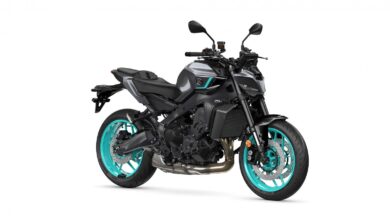Rich Kobes takes over as GM of Polaris marine operation
Rich Kobes was named general manager of the Marine division at Polaris Industries last year, replacing Ron Bills, who left the industry, but few people outside of Polaris know much about him.
Kobes, who joined Polaris in 1999, has a low profile in the marine industry because he’s been working on the manufacturing side of the business his entire career.
Calling himself a guy who is an engineer by interest and tendencies but isn’t certified, Kobes, 47, holds an MBA from Rochester Institute of Technology (RIT) in operations management. He’s handled everything from manufacturing lines and fuel systems at General Motors to operations and global logistics at Gateway Computer and supply chain management at several Midwest companies.
Since joining Polaris, he’s managed operations at its Spirit Lake, Iowa, manufacturing facility and directed operations at its Roseau plant. Those positions gave him first hand experience building PWC.
“Rich’s in-depth knowledge of and experience with the manufacturing side of our company make him uniquely qualified to lead one of our major product lines,” says Tom Tiller, Polaris president and CEO.
During a recent interview with Powersports Business, Kobes discussed his career and his outlook on the PWC industry and Polaris’ role in the marine business.
Kobes noted that because of his short time in the industry, his main challenge is to get to know the market and the competition. Now is not the time for him to be making predictions and forecasts, he noted.
Even though it is not a huge player in the marine business, Polaris has been making waves. Its new MSX 140 was named Watercraft of the Year by Ehlert’s Watercraft World magazine, a major industry award. “Never before has a manufacturer’s product emerged from the production lines with such a radically new design and substantially refined appeal,” says Matt Gruhn, Watercraft World editor. The design of the MSX platform brought influences from the automobile and motorcycle industries, he said.
The award-winning MSX lineup wasn’t the only big news Polaris made last year with its marine products. It also jumped into the sport boat business, launching the EX2100 Sport Boat line as part of a strategic alliance with Baja Marine and Mercury Marine. The line is powered by Mercury’s Jet Drive technology and is manufactured by Baja. The EX2100 was introduced with an MSRP of $23,999.
While it has innovative products, Polaris does not have a major share of the PWC market, holding something in the neighborhood of 11%. And PWC sales are slipping as a percentage of total Polaris sales as other segments of its business, especially ATV, utility vehicles and international operations, grow. In 2003, PWC sales were three percent of total Polaris sales, down from four percent in 2002.
Total Polaris PWC sales for the year ended Dec. 31, 2003, were $53.5 million, up one percent from the $53.1 million posted the previous year.
The company said the slow growth was caused by a soft economy that was reflected in relatively flat industry sales in 2003 and a later shift to 2004 model year production in preparation for the launch of its new MSX boat.
However, the average per unit sales price for its PWC increased 16% in 2003 over 2002, the company noted, due to a better product mix that included units with higher horsepower and direct injection.
One securities analyst, Tim Conder of AG Edwards, sees Polaris, marine division revenue growing 6.7% to $57 million this year due primarily to sportboat growth. He expects the overall PWC market at retail to be flat this year.
New View
While Kobes talks easily about his biggest achievements— ramrodding Polaris’ largest ever plant expansion, the 70,000 sq. ft Roseau project, and helping get the plant and the community through the disastrous flood that poured through the town in 2002, he speaks more guardedly about his new responsibilities.
“The biggest challenge, obviously,” he says, “is to gain marketshare in a flat market. It’s encouraging to see the recent spike in sales and, hopefully, $2/gallon gas doesn’t kill that off.
“Right now, I’m trying to get to know the industry, to learn the product that’s out there. I’ve only been here about three months.”
Kobes seems comfortable with Polaris’ product lineup. “The MSX platform is award-winning, it’s a good hull. And the response has been good from dealers and the press (on our sport boats.) “It’s a very good value, in my opinion, but it’s still too early to tell. This is the first full (sport boat) season for us.”
Noting that sport boats are a small segment of the boating market, a specialty market, Kobes sees more growth potential there than in PWC. Even though it’s a new market, it’s familiar territory. “We see the same list of characters as in powersports — Sea-Doo, Yamaha.”
But that’s not surprising, he says, noting that the engine technology and the pump technology is similar to that in PWC. “It’s a natural extension of the brand,” he says. “It adds another dynamic that we need.”
Polaris’ sport boat dealer network is still pretty young and needs work. “We want to get to 60 to 70 dealers, concentrated in the South.” Today, Polaris has about half that number.
“That’s a big priority for us,” Kobes says. “It’s not really that difficult; it’s more of a selection process. We’re very particular about the kind of dealer we bring in. We don’t want to add a significant number of dealers and then find out they don’t have the proper location or business model.” New sport boat dealers come from existing Polaris dealers as well as new dealers.
On the PWC side, Kobes says getting the cost down is a key factor in growing marketshare, probably below $8,000 to be really competitive, he says. “That’s why we’ve seen a lot of the market dry up — cost. You’re catering to customers who ride and drive PWC because that’s their first love; they have disposable income to have several toys. We want that customer, but we also want the customer who has to make a decision, who doesn’t have a lot of money.
“If we want to gain (markeshare), that’s the difference. But we’re not just making an entry level boat, we want to make one with quality. That’s why we’re looking at muscle craft.”
A competitor, Sea-Doo recently announced a new boat aimed at younger consumers. The 3D carries an MSRP of $6,999.
Kobes hasn’t ridden the 3D and wouldn’t comment on the move, other than to say that the price is a positive aspect.
“The low MSRP is a huge deal,” he says. “I don’t disagree; that’s what we are all driving at now. But the trick is that you have to make a little money at it.” psb




